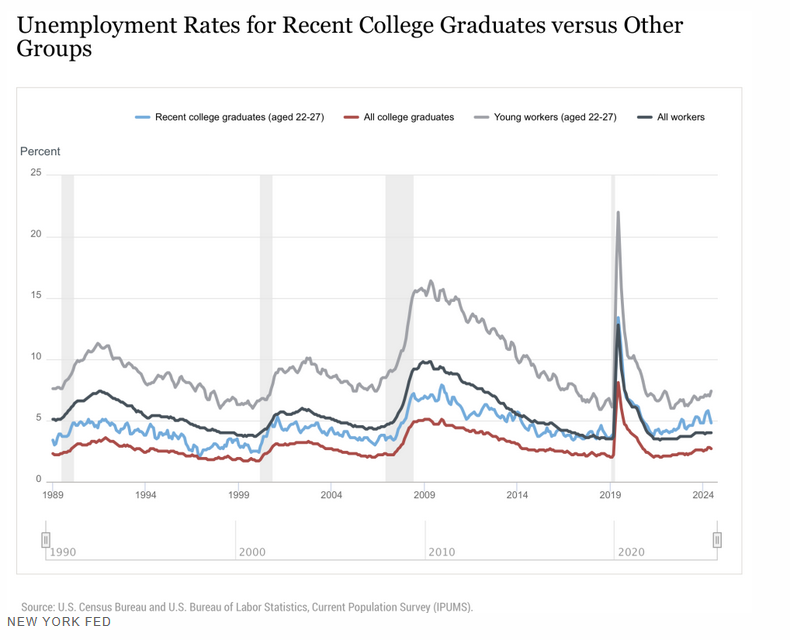Gen Z job crisis: Maybe there are just too many college graduates now
-
This post did not contain any content.

Gen Z job crisis: Maybe there are just too many college graduates now | Fortune
The percentage of Americans with a bachelor’s degree or higher is now 37.5%, up from 25.6% in 2000.
Fortune (fortune.com)
-
This post did not contain any content.

Gen Z job crisis: Maybe there are just too many college graduates now | Fortune
The percentage of Americans with a bachelor’s degree or higher is now 37.5%, up from 25.6% in 2000.
Fortune (fortune.com)
There were entire generations told diplomas were the only path to success and only "stupid people or drop outs" would do trades or jobs without a degree. Anecdotally speaking, most of the people I know who have jobs paying enough to purchase a house are in the trades, and most of them have phenomenal job security due to being hard to replace with another worker.
-
There were entire generations told diplomas were the only path to success and only "stupid people or drop outs" would do trades or jobs without a degree. Anecdotally speaking, most of the people I know who have jobs paying enough to purchase a house are in the trades, and most of them have phenomenal job security due to being hard to replace with another worker.
There were entire generations told diplomas were the only path to success and only “stupid people or drop outs” would do trades or jobs without a degree.
I wouldn't go as extreme as saying "diplomas are the only path to success" but even today, over time, a college degree is a better predictor of being employed than non-degree. The graph in the article shows this:

That dark orange line at the lowest measurement of unemployment is folks that have had a college degree and older than 27 years old. Keep in mind, the graph is covering about 35 years, so those earlier on the chart, in say the beginning in 1990 as the blue line with higher unemployment than older college grads join the older college grad statistic in 1997.
Further, the article is focusing on recent college grads being unemployed, but the graph shows that even this group has a significantly lower unemployment than "all young workers" which presupposes that group doesn't have a degree.
So even today "get a college degree instead of not" is good advice if you're looking for future employment. The extra advice I'd give on top of that is "don't go crazy into debt to get that degree". Folks graduating with a six figure student loan debt with only their bachelors are likely decades behind their peers that didn't take on such a large debt load. Community College people! Use it!
Trades can also be good, and I don't want to discourage that, but recognize the physical toll on the body it takes over a career and make sure to plan accordingly to transitioning to leadership or a lighter desk role as you advance in your trade career.
-
There were entire generations told diplomas were the only path to success and only “stupid people or drop outs” would do trades or jobs without a degree.
I wouldn't go as extreme as saying "diplomas are the only path to success" but even today, over time, a college degree is a better predictor of being employed than non-degree. The graph in the article shows this:

That dark orange line at the lowest measurement of unemployment is folks that have had a college degree and older than 27 years old. Keep in mind, the graph is covering about 35 years, so those earlier on the chart, in say the beginning in 1990 as the blue line with higher unemployment than older college grads join the older college grad statistic in 1997.
Further, the article is focusing on recent college grads being unemployed, but the graph shows that even this group has a significantly lower unemployment than "all young workers" which presupposes that group doesn't have a degree.
So even today "get a college degree instead of not" is good advice if you're looking for future employment. The extra advice I'd give on top of that is "don't go crazy into debt to get that degree". Folks graduating with a six figure student loan debt with only their bachelors are likely decades behind their peers that didn't take on such a large debt load. Community College people! Use it!
Trades can also be good, and I don't want to discourage that, but recognize the physical toll on the body it takes over a career and make sure to plan accordingly to transitioning to leadership or a lighter desk role as you advance in your trade career.
To add on to the community college bit:
Nobody who cares about what undergraduate university you went to actually cares. As long as it was an accredited program for the last year or two, you are good. And those who claim to care actually just care about who you networked with.
Things matter more for graduate school. But for undergrad? Save your money and do the first year or three at community college.
-
To add on to the community college bit:
Nobody who cares about what undergraduate university you went to actually cares. As long as it was an accredited program for the last year or two, you are good. And those who claim to care actually just care about who you networked with.
Things matter more for graduate school. But for undergrad? Save your money and do the first year or three at community college.
Since we're plugging community college more, I'd also like to add that quite a few community colleges offer bachelors degrees now! Many of these are a small fraction of the cost of a traditional 4 year school (even far cheaper than 4 year state schools from what I've seen).
I wish these were a thing when I got my Bachelors degree.
Here's an example of a Bachelor of Applied Science, Electrical Engineering Technology for less than $12,000 in tuition! (tack on another $2k for books I'd guess for 4 years), but $14k for a bachelors is damn cheap!

Search your state to see what schools near you offer these and in what programs:
-
This post did not contain any content.

Gen Z job crisis: Maybe there are just too many college graduates now | Fortune
The percentage of Americans with a bachelor’s degree or higher is now 37.5%, up from 25.6% in 2000.
Fortune (fortune.com)
Tech Executive for 20 years and in the industry for almost 30 here. If you are going into the technology field and are not loaded enough to go to Stanford or MIT, then I would second the "start at community college for the basics but graduate from a quality state university". Most people don't care where the diploma is from and NOBODY cares about your GPA. This applies to probably 98% of the jobs you will come across.
What truly matters most of the time is experience, flexibility, and breadth of knowledge. Make sure you do a ton of independent and well documented projects. A portfolio of your work is far more impressive than a diploma.
If instead of someone with a breadth of knowledge you are a specialist with a deep understanding of a single subject matter, then I suggest that you blog and/or self publish a lot of your work. Help people. Maybe build a community around your specific niche. YouTube etc videos about your niche is also a very good idea.
Finding work is much less about knowledge, because you are starting out and you don't know shit, and a hell of a lot more about marketing yourself.
-
Tech Executive for 20 years and in the industry for almost 30 here. If you are going into the technology field and are not loaded enough to go to Stanford or MIT, then I would second the "start at community college for the basics but graduate from a quality state university". Most people don't care where the diploma is from and NOBODY cares about your GPA. This applies to probably 98% of the jobs you will come across.
What truly matters most of the time is experience, flexibility, and breadth of knowledge. Make sure you do a ton of independent and well documented projects. A portfolio of your work is far more impressive than a diploma.
If instead of someone with a breadth of knowledge you are a specialist with a deep understanding of a single subject matter, then I suggest that you blog and/or self publish a lot of your work. Help people. Maybe build a community around your specific niche. YouTube etc videos about your niche is also a very good idea.
Finding work is much less about knowledge, because you are starting out and you don't know shit, and a hell of a lot more about marketing yourself.
I like what you posted here and agree with about 95% of it. I'm also at the high end of tech and frequently get asked by juniors which is the most important knowledge:
- Experience
- Certifications (Education from a vendor/profession)
- Degree (Education from academia)
I agree with you that, of those 3, experience is the most important, where we might diverge is that experience alone has limits. Someone that has experience, but no certs or degree will eventually likely hit a ceiling in their career where they can advance no further, and worse, it could eventually (after decades) be the reason they are fired.
The best answer is "Get all three!" However, I agree with you that if you have the opportunity for experience, seize it. Use it. Make mistakes. Learn from it, but don't stop with just experience. Expand your knowledge through education (certs) and seemingly unrelated subjects (business, accounting, marketing, etc) because these are ultimately what the technologies we support are driving. . If you know what your organization is trying to accomplish (via college education) you can bring the best solutions to bear (via industry certs), and be able to communicate that to the organization effectively (via college education) to be able to implement them (via experience).